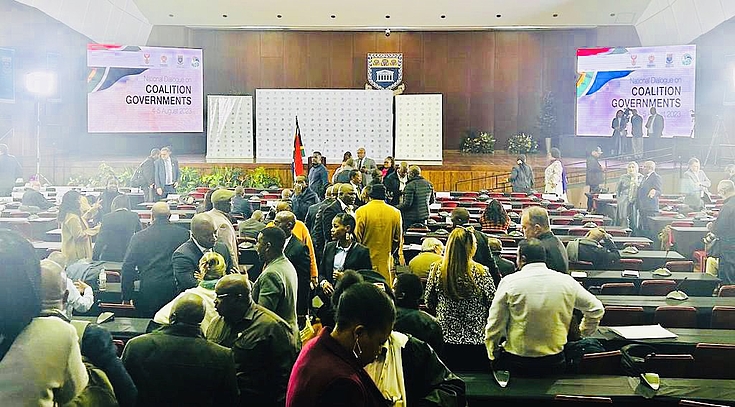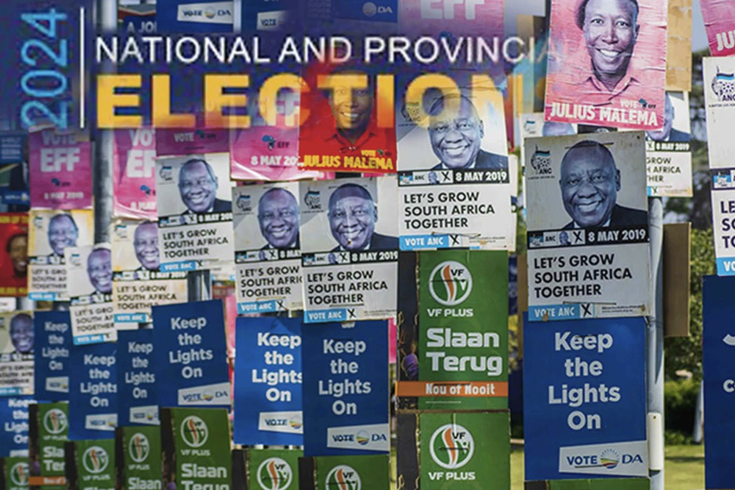New DOI Policy Brief
Coalition governments: What are the options for law reform at municipal level?

At the National Dialogue on Coalitions in August 2023
HSF
In August 2023, the Deputy President, in partnership with the University of the Western Cape and its Dullah Omar Institute (DOI), hosted a National Dialogue on Coalition Governments at the University of the Western Cape (UWC). The Dialogue sought to lay a foundation for the development of a National Framework on Coalition Governments in South Africa.
The new Policy Brief by Jaap de Visser and Tinashe Chigwata published by the DOI takes this discussion forward and explores two issues, namely (1) what are the options for thresholds at municipal level? and (2) how to ensure that municipal service delivery continues when there is instability.
Electoral thresholds aim at reducing fragmentation of politics and achieving greater stability in the legislature. The paper argues that there is a stronger case for an electoral threshold in local government than in national and provincial government. This is due to the fact that coalition turmoil at the local government level has an immediate impact on the functioning of the government. Since at national and provincial level, the legislature is mainly responsible for executive decisions and administration, coalition turmoil – in theory - does not immediately affect the running of government. In the debate on electoral thresholds, the paper argues that it is important to distinguish between national, provincial and local governments, which is often neglected.
Executive thresholds determine the participation in the executive: if a party occupies less than the required threshold of seats in the legislature, it is barred from participation in the municipal executive. While at present there is no such executive threshold in a municipal executive, provincial or national cabinet in South Africa, a variation of the executive threshold exists in the executive committee system of a municipality. The paper points out that while the executive committee system offers some solution to coalition instability, it is not a silver bullet since an executive committee does not manufacture agreement on policy matters, among its members or among a coalition.
However, the paper argues that the debate on legislative efforts to stabilise coalition governance should include the concept of the collective executive system and its advantages and disadvantages.

Party Posters in South Africa
HSF
The second part of the Policy Brief takes a closer look at the issue of administrative stability during coalition turmoil. The authors discuss the impact of a governance vacuum, created when a council regularly fails to convene or take decisions, on service delivery and development in communities.
While on national and provincial level there is a separation of powers between the executive and legislature, there is no separation of powers at the local level. The council exercises both the executive and legislative powers. When a council fails to meet or take decisions, the quality of service delivery is compromised, stops or takes place at a snail's pace. Since a council is ultimately accountable at the local level, inability or unwillingness of councillors to carry out their responsibilities create a governance disaster due to the decision making vacuum. At the same time, unlike the municipal manager (MM) who can be personally held liable for certain service delivery failures, there is no similar provision when it comes to councillors.
To ensure that there is no decision making vacuum, the authors suggest, the MM could be assigned extraordinary powers to act on behalf of the council, mayor, executive committee, or mayoral committee whenever any of these institutions are unwilling to make decisions due to instability in the council. These powers would enable the MM to make decisions relating to the day-to-day running of a municipality and ensure the continuing delivery of services. However, it is pointed out, that these powers may come with the risk of abuse. The paper suggests a number of measures that could be effective in minimising this risk.
You can find the paper online here:
Coalition governments: What are the options for law reform at municipal level?
Subscribe to our Newsletter to receive event invitations and new publications via email - and follow us on Facebook and Twitter for news about our work.
